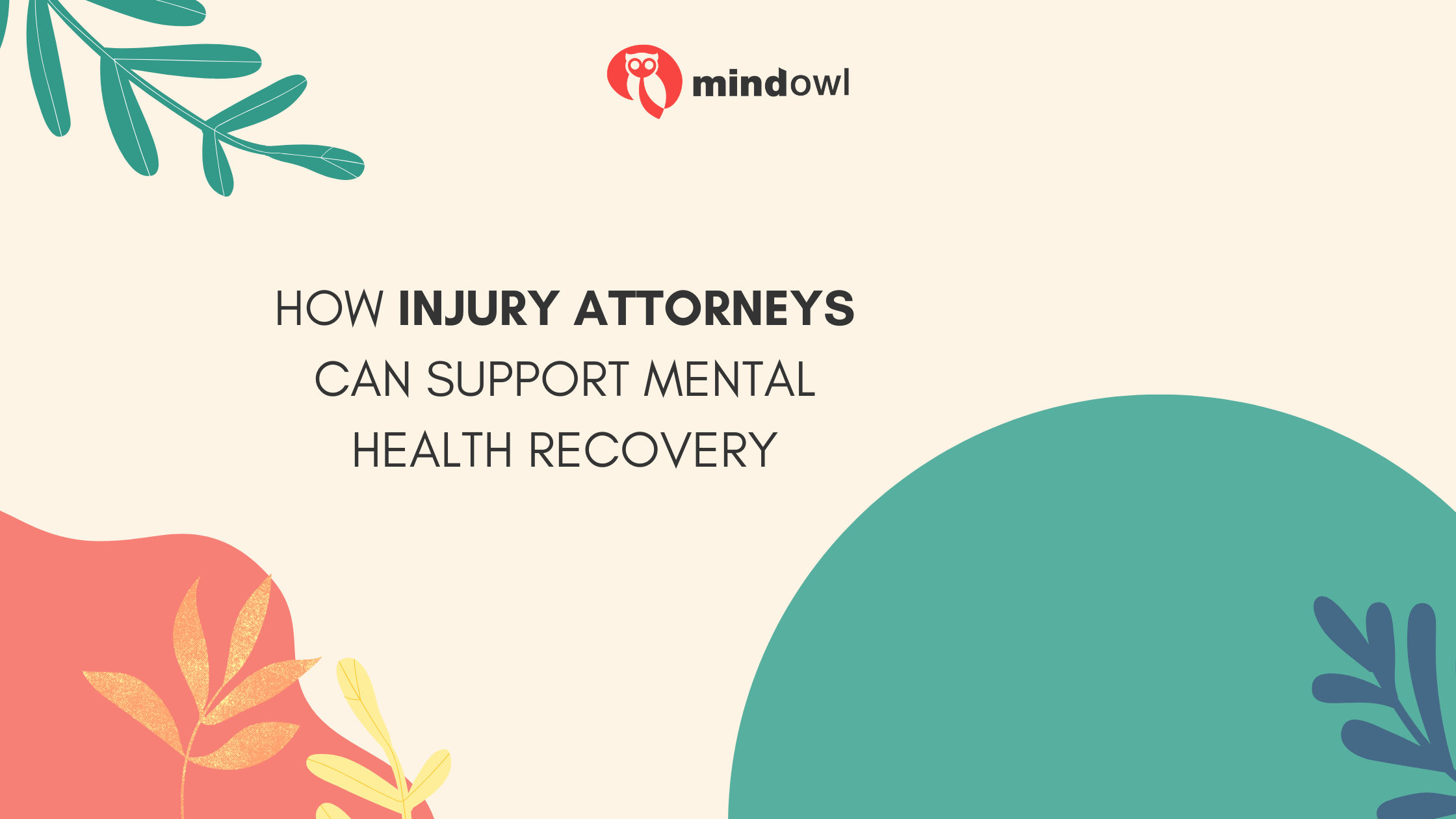
Getting hurt in an accident is never just about the physical injuries you can see.
The emotional and mental trauma that follows can be just as devastating – sometimes even worse. But here’s what most people don’t realize about injury cases…
The psychological wounds are often invisible.
And without the right support from an experienced injury attorney who understands mental health recovery, you might not get the compensation you deserve for the full extent of your injuries.
What you’ll discover:
- Why Mental Health Matters In Personal Injury Cases
- How Injury Attorneys Champion Psychological Recovery
- The Hidden Connection Between Legal Support And Healing
- Building Your Mental Health Recovery Strategy
Why Mental Health Matters In Personal Injury Cases
Let me tell you something that might shock you…
70% of adults in the U.S. have experienced some type of traumatic event at least once in their lives. That means if you’ve been injured in an accident, you’re not alone in dealing with the psychological aftermath.
The problem is that most people focus only on getting their broken bones fixed and their visible wounds healed. They completely ignore the anxiety, depression, and trauma that come with being in a serious accident.
This is where having the right injury attorney makes all the difference. A skilled lawyer like those at Kogan & DiSalvo in North Miami Beach, FL understands that your mental health recovery is just as important as your physical healing. They know how to document psychological injuries and fight for compensation that covers all aspects of your suffering.
But most injury attorneys don’t get it. They focus on the easy stuff – medical bills, lost wages, and physical therapy costs. Meanwhile, you’re left dealing with nightmares, panic attacks, and depression on your own.
That’s not fair. And it’s not right.
Your emotional suffering deserves recognition and compensation just like any other injury.
How Injury Attorneys Champion Psychological Recovery
Want to know what separates good injury attorneys from great ones?
The great ones understand that psychological trauma isn’t just a side effect of your accident – it’s a core part of your injury that needs specialized attention and compensation.
Smart injury attorneys work closely with mental health professionals to document your emotional distress. They bring in psychologists and therapists who can explain to insurance companies and juries how your accident has affected your mental well-being.
This isn’t just about getting you more money (although that’s important too). It’s about making sure you have the resources needed for complete recovery.
Here’s what trauma-informed injury attorneys do differently:
They create a safe environment where you feel comfortable sharing your emotional struggles. They understand that trauma can make you forgetful, anxious, or unable to concentrate during meetings. They build your case around the complete picture of your injuries.
This comprehensive approach leads to better outcomes for clients. When insurance companies see that you have an attorney who takes psychological injuries seriously, they’re more likely to offer fair settlements.
The Hidden Connection Between Legal Support And Healing
There’s something most people don’t understand about legal representation and mental health recovery…
Having a strong injury attorney on your side actually helps you heal faster.
Here’s why: When you’re constantly worried about medical bills, insurance companies, and legal deadlines, your stress levels stay elevated. This chronic stress interferes with your body’s natural healing process and makes it harder to recover from physical and emotional trauma.
But when you have a competent attorney handling the legal side of your case, you can focus your energy on getting better. Your lawyer takes care of all that while you concentrate on therapy and recovery.
Research shows that people who feel supported during their recovery process heal faster and more completely than those who try to handle everything alone. A good injury attorney provides that crucial support system during difficult times.
This creates a positive cycle where better legal support leads to better mental health.
Building Your Mental Health Recovery Strategy
Successfully recovering from physical and psychological injuries requires a comprehensive strategy that goes beyond showing up to doctor appointments.
Your injury attorney should be a key player in building this strategy. They should work with your medical team to understand your recovery needs and fight for compensation that covers all aspects of your treatment.
28% of lawyers struggle with depression themselves, which means many attorneys understand firsthand how mental health challenges can impact their lives. This personal understanding makes them better advocates for clients dealing with psychological trauma.
Your attorney should help you document your mental health journey properly and present this information in a way that insurance companies and courts will understand.
The goal is to secure compensation that allows you to focus on healing without worrying about financial stress. This might include coverage for ongoing therapy, lost earning capacity due to depression or anxiety, and pain and suffering damages.
Remember: Your mental health recovery is not a luxury – it’s a necessity.
The Financial Reality of Mental Health Treatment
Let’s talk about something most people don’t want to discuss but need to understand…
Mental health treatment is incredibly expensive, and costs add up fast. A single therapy session can cost anywhere from $100 to $300, depending on your location and specialist type.
This is why having an injury attorney who understands the long-term financial impact of psychological trauma is important. They can help you calculate the true cost of your mental health recovery and fight for compensation that covers these expenses.
49.31% of legal practitioners experienced increased mental health issues in recent years, highlighting how widespread psychological struggles have become. This growing awareness means courts and insurance companies are more likely to recognize and compensate for mental health damages.
Your attorney should also consider how your psychological injuries might affect your earning capacity. If depression, anxiety, or PTSD makes it difficult for you to work, you deserve compensation.
Getting The Support You Need
Recovery from psychological trauma isn’t something you can do alone.
You need a team of professionals working together to support your healing journey. This team should include mental health professionals, medical doctors, and an injury attorney who understands trauma-informed legal practice.
Your injury attorney plays a crucial role in coordinating this team. They can help you find qualified mental health professionals, ensure your treatment is documented, and fight for the compensation you need.
Look for an attorney who asks about your emotional well-being, not just your physical injuries. They should understand that psychological trauma can be just as debilitating as physical injuries.
30% of TBI survivors continue to need assistance from others, showing that recovery is often a long-term process requiring ongoing support.
With the right legal team and proper compensation, you can access the mental health treatment needed to rebuild your life after a traumatic injury.
Securing Your Future Starts Now
Mental health recovery takes time, patience, and resources.
Without proper legal representation, you might not get the compensation needed to access quality mental health care. This can leave you struggling with untreated trauma long after physical injuries have healed.
The good news is that courts are increasingly recognizing the validity and importance of psychological injury claims. With the right attorney fighting for you, you can secure compensation that covers all aspects of your recovery.
Don’t wait to get the help you need. Both your mental health recovery and legal case benefit from prompt attention and professional support. The sooner you start building your case with an experienced injury attorney, the better your chances of securing complete healing.
MindOwl Founder – My own struggles in life have led me to this path of understanding the human condition. I graduated with a bachelor’s degree in philosophy before completing a master’s degree in psychology at Regent’s University London. I then completed a postgraduate diploma in philosophical counselling before being trained in ACT (Acceptance and commitment therapy).
I’ve spent the last eight years studying the encounter of meditative practices with modern psychology.

